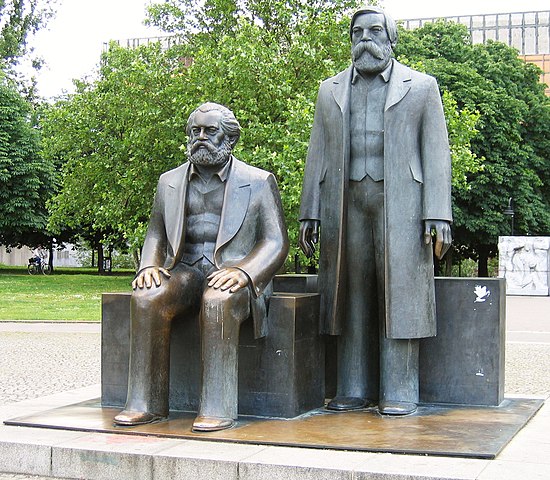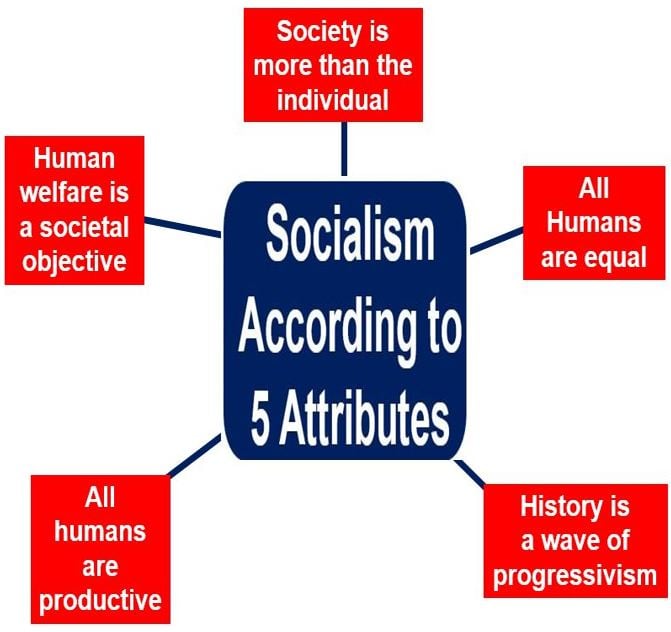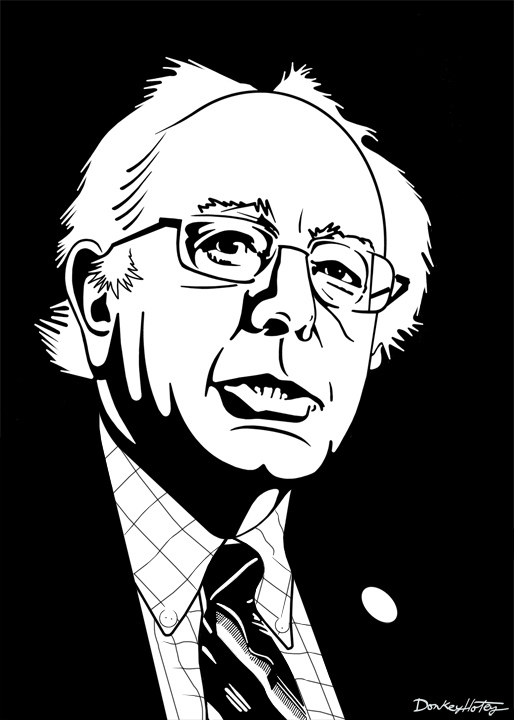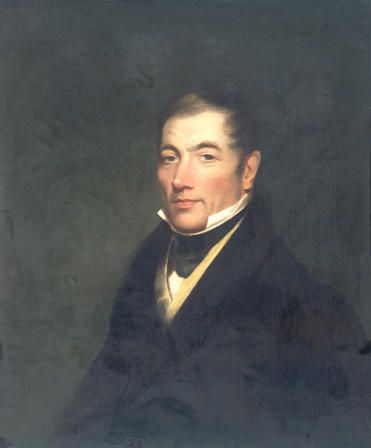
Statue of Karl Marx & Friedrich Engels, Berlin.
Photo by Johann H. Addicks
Topics on the Page
Overview: Labor and Trade Unions
- African Americans and the U.S. Labor Movement
Socialism
- 5 Attributes of Socialism
- Bernie Sanders, U.S. Senator and Presidential Candidate
- U.S. Representative Alexandria Ocasio-Cortez
Robert Owen
Karl Marx
Communism vs. Capitalism
 CROSS-LINKS:
CROSS-LINKS:
Focus Question:
How did the ideas of Robert Owen and Karl Marx influence the development of unions and socialism as responses to the Industrial Revolution?
To understand the rise of unions, socialism, and the ideas of Robert Owen and Karl Marx, one must first understand the consequences of the Industrial Revolution.
- By the end of the 19th century, working and living conditions for working classes were intolerable, poverty was rampant, and child labor and impossible work hours exploited human beings in numerous ways.
- In response, labor unions and socialist parties arose in an effort to give workers a way to express their grievances and seek changes in industrial practices.
 Timetoast Timeline - Industrial Revolution
Timetoast Timeline - Industrial Revolution
To get a quick overview on Karl Marx and the impact of Communism, watch this video
Trade and Labor Unions
"The Hand That Will Rule the World"
Political Cartoon by the International Workers of the World (June 30, 1017)

Background sources on the Industrial Revolution - The Internet Modern History Sourcebook at Fordham University
Trade Union History from Trade Union Congress, London Metropolitan University
The Early Labor Movement
In the eighteenth century, much of Western society witnessed the world’s first Industrial Revolution and the abandonment of an agrarian culture with craft based production. The young industrial environment provided much of the momentum for the establishment and advancement of the labor union.
The start of the Industrial Revolution sparked a rising fear in the craft associations of the time, who feared encroachment on their established jobs, wage changes, and workforce restructuring.
The rapid expansion of the industrial society quickly drew large numbers of women, children, rural workers, and immigrants into the work force to labor for meager wages in appalling conditions. These working environments would sow the seeds of the early labor movement.
Over the last three hundred years, trade/labor unions have developed into a number of forms, influenced by differing political and economic regimes. The immediate objectives and activities of trade unions vary, but may include:
- Provision of benefits to members: Early trade unions provided a range of benefits to insure members against unemployment, ill health, old age and funeral expenses. Professional training, legal advice, and representation for members is still an important benefit of trade union membership.
- Collective bargaining: Trade unions are able to operate openly and are recognized by employers, and they may negotiate with employers over wages and working conditions.
- Industrial action: Trade unions can organize strikes or resistance to reach certain wants and goals.
- Political activity: Promotion of favorable measures to the interests of their members or workers as a whole. They can practice campaigns, undertake lobbying, or financially support individual candidates or parties.
- Protect workers rights: Trade unions protect the rights of workers in their membership. Each worker should not be abused by the employer and has a right to demand a fair wage, safe working conditions and equal rights under the law.
- Dispute Resolution: Trade unions represent the interests of workers in the event of a dispute. They intervene through implementing grievance mechanisms as well as providing conflict resolution through arbitration and mediation.
- Improving working conditions: Trade unions strive to improve the working conditions of the workers they represent. These can be done in advocating for shorter working hours and better working conditions
 London Metropolitan University has an interactive timeline on the British trade union movement.
London Metropolitan University has an interactive timeline on the British trade union movement.
Labor History Timeline from the AFL-CIO.
 Click here for a PBS lesson plan on trade unions, in which the students act out a negotiation. Click here for a lesson plan on labor unions in the US, in which the students hold a mock trial to find out who is to blame for workplace disasters
Click here for a PBS lesson plan on trade unions, in which the students act out a negotiation. Click here for a lesson plan on labor unions in the US, in which the students hold a mock trial to find out who is to blame for workplace disasters
African Americans and the Labor Movement
 The Black Man and the Unions written by W.E.B. DuBois in March, 1918.
The Black Man and the Unions written by W.E.B. DuBois in March, 1918.
Socialism
Socialism is a system of government in which the state controls the economy and runs businesses for the benefit of citizens.
It is a socioeconomic system where property and the distribution of wealth are under social control. This control may be either:
- Direct: exercised through popular collectives including workers’ councils
- Indirect: exercised on behalf of the people by the state.
More Definitions: Socialism
- a political and economic theory of social organization that advocates that the means of production, distribution, and exchange should be owned or regulated by the community as a whole.
- Economic system where everyone equally owns production.
- Any of various economic and political theories advocating collective or government ownership and administration of the means of production and distribution of goods.
- a system of society or group living in which there is no private property.

The origin of modern socialist movements is found in the working class.
 Here for a timeline of socialism beginning in 1799.
Here for a timeline of socialism beginning in 1799.
Social critics saw themselves as reacting to the excesses of poverty and inequality in the period, and pushed for reforms such as the egalitarian distribution of wealth and the transformation of society into small communities. Socialism implied the elimination of money, markets, capital, labor, and commodity.
Click here for a video for a quick video that looks at the root of socialism, its history, and how it fits into political ideologies.
For a more in-depth explanation of socialism click here.
Sourcebook on Socialism - The Internet Modern History Sourcebook at Fordham University
 Link to a Crash Course overview video on Capitalism and Socialism, including info on Karl Marx.
Link to a Crash Course overview video on Capitalism and Socialism, including info on Karl Marx.

Bernie Sanders, U.S. Senator and Presidential Candidate
Bernie Sanders: Socialist or Democratic Socialist?
What Kind of Socialist Is Bernie Sanders?
Trump Knocks Socialism and Bernie Sanders Does Not Look Pleased (February 5, 2019)
Alexandria Ocasio-Cortez, U.S. Representative
Alexandria Ocasio-Cortez Official Website

Ocasio-Cortez Twitter
Robert Owen: (1771-1858)

View this video to learn about Robert Owen and his New Harmony experiment
- At the beginning of the 19th century reformers like Robert Owen were concerned with the social conditions that the factory system seemed to be creating.
- Owen was a prominent industrialist who began to advocate for the establishment of new communities that would alleviate the poverty and suffering that resulted from the Industrial Revolution.
- Considered the father of the co-operative movement and one of the first socialist thinkers, Robert Owen founded New Lanark, a model factory community in Scotland.
- It is widely regarded as one of the earliest examples of open primary education, limited work hours, disabled worker compensation, and other innovations of labor movements in the 19th century.
- Owen believed that if you could change the environment you could change the person. This instinct to help his fellow man and a consciousness that class was not inherent in the person but a result of the conditions in which the person lived, formed central themes in socialist thought throughout its development.
- He believed it was the business's responsibility to provide for laborers: housing, health, food and education. This is known as the corporate responsibility approach where business owners need to be more responsible for workers.
Click here to read a collection of primary sources written by Owen about New Views of Society provided by Yale University.
- Owen believed that the root evils in society were the institutions of religion, marriage, and most importantly private property. He attempted to create a community without these institutions, hoping that it would change the way people behaved.
- He envisioned rural villages composed of farms and small-scale industry that operated cooperatively by the citizens.
- Along with Charles Fourier, he laid out specific ideas for the communities including population and land sizes.
- However, his attempt to create a Utopian community in New Harmony, Indiana failed for a number of reasons.
- Throughout the remainder of his life, Owen promoted the idea of 'socialism' and became one of the leaders of Britain's growing labor movement. Although he had some harsh criticisms of competition, private property and the market economy, which drew some people away from his ideas; his advocacy helped to create cooperative societies, labor exchanges, and trade unions.
 Timeline:
Timeline:
- 1799 - Owen purchased cotton mill in New Lanark, Scotland; planned to make into an experimental industrial community to prove that a factory can be both profitable and humane

- 1824 - Owen moves to America, created experimental 1,000 member colony called New Harmony in Indiana; although a center for progressive thought, members lacked the practical skills needed to keep the community together.
- 1828 - New Harmony collapses, Owen returns to London; begins to promote vision of what he began to call 'socialism'
Helpful Owen Sites:
- Click here for a lesson plan on various economic systems
Karl Marx: (1818-1883)
Portrait of Karl Marx (before 1875)

"No thinker in the nineteenth century has had so direct, deliberate and powerful influence upon mankind as Karl Marx" (Isaiah Berlin, quoted in Karl Marx: His Life and Environment, Oxford University Press, 1970, p. 1).
 Marx and Engels' Writings
Marx and Engels' Writings
 Audiobook with text of The Communist Manifesto
Audiobook with text of The Communist Manifesto
 Berlin, Isaiah. (1963). Karl Marx: His life and environment. (Third Edition). New York: Oxford University Press.
Berlin, Isaiah. (1963). Karl Marx: His life and environment. (Third Edition). New York: Oxford University Press.
- Karl Marx was a German writer and philosopher of history and economics, whose ideas significantly influenced the development of socialist theory and political economic thought in totality.
- Although most Marxist theories are attributed only to him, Karl Marx's friend Friedrich Engels was a driving force in the creation and production of Marx's ideas.
- Trade unionists and socialist political parties were greatly inspired by the writings of Karl Marx and Friedrich Engels, notably Das Kapital (1867) and The Communist Manifesto (1848).
- Marx believed that "the history of society is the history of man seeking to attain mastery of himself and of the external world by means of his creative labour" (Berlin, 1970, p. 7).
- Marx describes history through the lens of class struggle - the perpetual struggles of different social classes. It is from this class struggle that historical progress emerges, as one social class triumphs over another.
- In his critique of Industrial Capitalism, Marx argues that the dominant struggle of his time was between the proletariat (the working classes) and the bourgeoisie (the ruling classes); the conflict between those that own the means of production and those that must sell their labor in order to survive.
- Thus to Marx, history is defined between the social interactions of oppressors and the oppressed. The oppressors control the means of production and the government, leaving the oppressed with no way to resist exploitation and domination. Capitalist Industrial society continues this pattern of class warfare, pitting the “bourgeoisie” (owners) against the “proletariat” (workers).
- In the Communist Manifesto, Marx predicts that dire working conditions caused by the industrialization will lead to a series of revolutions that would transform human beings and ultimately remove the need for a state.
- Marx sought a new vision of society in which the workers would rise up against their oppressors, seize control of organizations and institutions, and create a classless system in which everyone could prosper. For Marx, the fall of the bourgeoisie and the rise of proletariat were both inevitable.
The Original Communist Manifesto

 Timeline
Timeline
- 1844 - Karl Marx and Friedrich Engels meet in Paris France.
- 1848 - Marx and Engels publish the Communist Manifest; predicted that as capitalism progresses, the working class would become so large, poor and unhappy that revolution would be inevitable. This would lead to 'socialism', a workers state where people contributed to their ability and received according to their need. Government would soon be unnecessary and a new, stateless society would take way - 'communism'.
- 1867 - Marx publishes the first volume of Das Kapital; an attempt at analyzing all aspects of life through the economic forces of history.
- 1883 - Marx dies.
- 1885 - Engels publishes the second volume of Das Kapital, edited by Engels from an earlier draft by Marx.
- 1894 - Engels publishes the third volume of Das Kapital.
- 1895 - Engels dies.
 Timetoast Timeline
Timetoast Timeline
- Click here for a list of resources on Karl Marx from Mr. Donn's
Important Things to Note:
- Marx's emphasis on class struggle throughout "history of all hitherto existing society" is heavily dependent on the German Philosopher Georg Wilhelm Friedrich Hegel's theories of dialectics.
- The personal relationship between Karl Marx and Fredrick Engels is an interesting irony; it is not coincidental that as with most intellectual and political movements, the privileged leisure time afforded by Marx’s and Engels’ class status enabled them to write the definitive critique of class status.
- Critique of Marx's Ideas:
- Marx and Engels envisioned society was idealist.
- A classless society means there is no government and no one to regulate the state.
- Socialism is utopian and causes chaos in the state.
- A state with no private property where everyone shared everything will be ungovernable
Helpful Marx Sites:
Review the material on Karl Marx with this Jeopardy-style game.
Communism vs Capitalism: A Tale of Opposites
- After Marx's death his Marxist ideologies were morphed into a state based ideology known as Communism.
- Communism was a unifying force for the working and burgeoning middle classes of the early 20th century.
- Numerous revolutions sprung up as a result of the adoption of Communist ideologies across the world.
- However, it was not until the end of the second World War that Communist and Capitalist nations truly began to clash.
- This was the beginning of the Cold War, a series of conflicts and proxy wars between Western Capitalist Powers in NATO, against the USSR and various Communist Powers.
- The Cold War started in 1945 with the Separation of Berlin, and lasted until the demolition of the Berlin Wall in 1991.
To see a full list of U.S.-Soviet Proxy Wars click here
Watch this Crash Course History Video on the Cold War here
African Americans and the U.S. Labor Movement
 The Black Man and the Unions written by W.E.B. DuBois in March, 1918.
The Black Man and the Unions written by W.E.B. DuBois in March, 1918.
References:
Donnachie, Ian (2003) Education in Robert Owen's New Society. Retrieved 26 February 2011 from The Encyclopedia of Informal Education's site: http://www.infed.org/thinkers/et-owen.htm.
Duiker, W. J. & Spielvogel, J. J. (2002). The essential world history. Belmont, CA: Wadsworth.
Elwell, Frank, 2003, The Sociology of Karl Marx: http://www.faculty.rsu.edu/~felwell/Theorists/Marx/index.htm
Karl Marx (2010). Retrieved on 26 February 2011 from Stanford Encyclopedia of Philosophy's site: http://plato.stanford.edu/entries/marx/.
Karl Marx. Retrieved 26 February 2011 from Spartacus Educational's site: http://www.spartacus.schoolnet.co.uk/TUmarx.htm.
Friedrich Engels. Retrieved 26 February 2011 from Spartacus Educational's site: http://www.spartacus.schoolnet.co.uk/TUengels.htm.
Marx and Engels' Writings. Retrieved 26 February 2011 from Marx and Engels' Writings's site: http://marx.eserver.org/.
Marxism Page (2011). School of Politics and International Relations, College of Arts and Social Sciences at the Australian National University:
http://www.anu.edu.au/polsci/marx/
Montagna, Joseph A. (2012). The Industrial Revolution as discussed by the Yale University/New Haven Teachers’ Institute: http://www.yale.edu/ynhti/curriculum/units/1981/2/81.02.06.x.html
PBS (2005). Timeline - Heaven on Earth: The Rise and Fall of Socialism. Retrieved 23 February 2012 from PBS site: http://www.pbs.org/heavenonearth/timeline.html
PBS (2005). 'Leaders and Thinkers: Robert Owens.' Heaven on Earth: The Rise and Fall of Socialism. Retrieved 23 February 2012 from PBS site:
http://www.pbs.org/heavenonearth/leaders_thinkers_owen.html
PBS (2005). 'Leaders and Thinkers: Karl Marx and Friedrich Engles'. Heaven on Earth: The Rise and Fall of Socialism. Retrieved 23 February 2012 from PBS site: http://www.pbs.org/heavenonearth/leaders_thinkers_marx_engels.html
Robert Owen (2004). Retrieved 26 February 2011 from The History Guide's site: http://www.historyguide.org/intellect/owen.html.
Spencer, L and Krauze, A. Hegel for Beginners Published by Icon Books, 14 of 175 pages reproduced here. Retrieved 23 February 2012 from site: http://www.marxists.org/reference/archive/hegel/help/easy.htm
http://www.newworldencyclopedia.org/entry/Labor_union
https://youtu.be/TMmDebW_OBI
https://museum.wales/media/6054/nmwa531.jpg
https://i1.wp.com/infed.org/mobi/wp-content/uploads/2013/01/karl-marx-wikimedia-commons.jpg?resize=639%2C545
https://www.britannica.com/topic/North-Atlantic-Treaty-Organization
https://en.wikipedia.org/wiki/List_of_conflicts_related_to_the_Cold_War
https://www.youtube.com/watch?v=y9HjvHZfCUI
Comments (0)
You don't have permission to comment on this page.